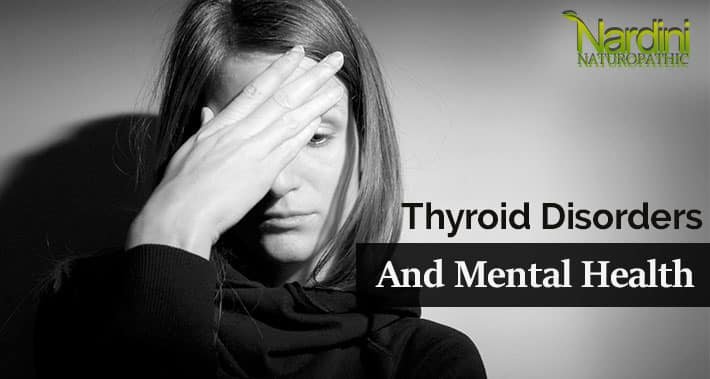
As a naturopathic doctor with a special interest in thyroid disorders, much of my practice revolves around the function of this little gland in your neck.
So, if you take a look at my website to see what sorts of conditions I have a special interest in treating – chronic fatigue, immune health, skin conditions, and cardiovascular health, to name a few – you’ll find that many of them are connected with thyroid and endocrine issues.
But what you may not realize is that even mental health concerns like anxiety and depression are intricately linked with the health of your thyroid.
Your Thyroid And Mental Health
When it comes to mental health, there are a number of natural paths you can take to improve things.
These include exercise, a healthy diet, and a more efficient sleep pattern.
These have all been shown to help with anxiety, depression, stress, and other mental illnesses, and have been written about extensively across the internet.
But if you’ve tried these things, and they aren’t helping, it could be connected to your thyroid.
Hypothyroidism And Depression
Hypothyroidism is a disorder where your body isn’t producing as much thyroid hormone as it ought to be.
This can manifest itself in many different symptoms, some of which are linked with your mental health.
When your thyroid slows down, many of the functions associated with your thyroid and endocrine system can slow down in turn.
So, while depression is one of the factors associated with hypothyroidism, it’s far from the only one.
You may also have “fuzzy thinking”, or “brain fog” – a symptom where it becomes more difficult to think clearly about things or focus on tasks.
On top of this, your reflexes may have slowed, and you may be experiencing chronic fatigue – all things which you may relate to feeling depressed.
However, there are other symptoms associated with hypothyroidism which could also be categorized as a “slowing down” of things.
This includes:
• Low blood pressure
• Constipation
• Weight gain
• Bloating
If your depression comes with any of the above symptoms, you may be suffering from hypothyroidism.
Hyperthyroidism And Anxiety
If hypothyroidism slows you down, hyperthyroidism speeds you up.
Hyperthyroidism is a condition where your thyroid is kicked into overdrive.
It’s working harder than it should be, producing more thyroid hormones than it ought to.
And like hypothyroidism, it can be connected with mental health issues.
Particularly, hyperthyroidism is associated with anxiety.
As your body works overtime, it can manifest itself in feelings of anxiety.
When coupled with the frequent insomnia which is also associated with hyperthyroidism, this can be a troubling disease to deal with.
There are other symptoms associated with hyperthyroidism as well, many of which are the inverse of hypothyroidism.
These include:
• High blood pressure
• Diarrhea
• Weight loss
If you’re feeling high levels of stress, as well as the above symptoms, you may be suffering from hyperthyroidism.
Hypothyroidism And Bipolar Disorder
If you’ve been diagnosed with bipolar disorder, you may also have a thyroid disorder.
This can be a major issue if you’ve been prescribed lithium carbonate to treat your bipolar episodes.
Lithium carbonate (or just lithium, as the common phrase for it goes) has been shown to be damaging to your thyroid.
This is because lithium inhibits the release of T4 and T3 hormones, two hormones which are critical for your thyroid’s proper function.
The mechanism by which this happens is not yet fully understood.
However, what is understood is that if bipolar disorder is linked with hypothyroidism, and the drug taken to treat your bipolar episodes actively contributes to hypothyroidism, you may be in for a rough time.
If you’ve been diagnosed with bipolar disorder, you may also be dealing with hypothyroidism without even knowing it.

You may have noticed that the symptoms listed above are fairly common – you could surely find at least a few other disorders that share many of the above symptoms.
This makes thyroid disorders notoriously difficult to spot, and it’s why according to the American Thyroid Association, up to 60% of those with a thyroid disorder don’t even know they have it.
You may visit your medical doctor or a psychiatrist for help with these symptoms, and they may prescribe you antidepressants or sleeping pills.
These may help alleviate some of your symptoms, but the underlying issue with your thyroid will still be there.
Another issue is the idea of what the “normal” level of thyroid hormone should be.
In the past, doctors referred to the levels of your TSH (thyroid stimulating hormone) as being “normal” if they were between 0.5 and 5.0 mIU/L.
But that has since been discredited, and the American Association of Clinical Endocrinologists has been advising for levels of between 0.45 and 4.12 mIU/L.
However, some labs still refer to the old numbers.
As a result, you may have a thyroid disorder and not know it, even if your results came back within “normal” range.
On top of this, you may report within normal range and still not be at the optimal level.
You may have high or low levels of TSH being produced in your body, but you don’t meet the official diagnosis until you’re above that specific number.
Because of the precise nature of numbers, you may be 0.1 mIU/L away from hyperthyroidism or hypothyroidism, but because your TSH levels fall within “normal” range, you’re considered to be healthy.
Clearly that’s not the case.
Finally, even if your TSH within the “normal” range, it does not guarantee that your thyroid system is functioning optimally.
For more on how this works, read my previous article about how your thyroid stimulating hormone works.
This article originally appeared on the blog of Dr. Pat Nardini, a naturopathic doctor in Toronto. It appears here on Steemit with the full permission of the original source.
Congratulations @csmedia! You have completed the following achievement on Steemit and have been rewarded with new badge(s) :
Click on the badge to view your Board of Honor.
If you no longer want to receive notifications, reply to this comment with the word
STOPCongratulations @csmedia! You have received a personal award!
Click on the badge to view your Board of Honor.